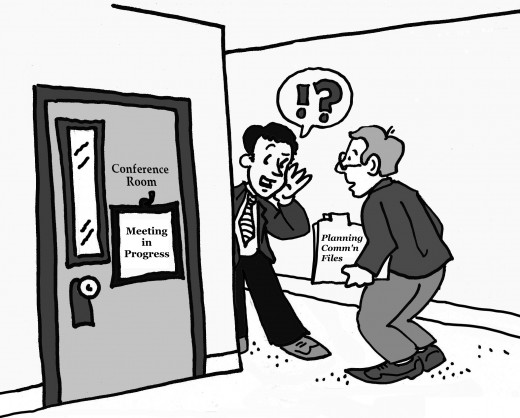In a recent PlannersWeb survey of readers, this topic was one that many of you requested. So with our apologies to David Letterman, and in the spirit of helping you avoid the holes in the rocky road of being a planning commissioner, we present the Top Ten Mistakes to Avoid When Holding Public Hearings or Meetings.
For many of our suggestions, please speak with your municipal attorney — obviously laws vary from state to state. Also, take a look at the sidebar to your left for related articles from the planning commissioners Journal.
10. Knowing the difference between a public hearing and a public meeting. These are two different kinds of gatherings for very different purposes. A public meeting is generally defined as a meeting in which business is conducted by a public body. This may or may not include participation by the public. A public hearing is a special type of public meeting for the purpose of the governing body accepting public comment and testimony on local legislation. In a number of communities, the elected body holds public hearings and the planning commission holds public meetings, though this will be governed by state statute. The standards for public hearings and public meetings should be contained within your planning commission by-laws and in your zoning ordinance.
9. Improper notice. Most if not all states have an open meetings law to ensure that all business of the local government is transparent and adequate notice is given so the public can attend meetings where business is discussed. These transparency standards generally apply to ALL levels of local government, including the planning commission and other local advisory bodies.
We have heard planning commissioners from various locations say, “we don’t have to advertise meetings if we’re not going to be voting on anything.” Most states’ statutes for open meetings apply to all meetings held by all public bodies. Therefore to avoid having your actions challenged on the basis of an Open Meetings Act violation, you should give adequate notice of all planning commission meetings, even for site visits to review subject properties for rezoning requests.
8. Engaging in ex parte communication. Someone who knows you’re a planning commissioner sees you in the checkout line at the grocery store, or at church, or at the PTO meeting, and wants to talk to you about a pending rezoning or a development permit under consideration. Though it may seem harmless, this is an important mistake to avoid.

Ex parte communication is a violation of open meeting laws because you are giving one person unfair advantage by discussing a business matter outside of a public meeting where everyone present would otherwise have access to the same information. When you are approached for ex parte communication, politely explain that this is official government business and you simply cannot discuss it outside of a properly advertised meeting. Then invite the person to attend the next meeting of the planning commission.
7. Actual or apparent conflict of interest. If you or a member of your family stands to gain from a case before the planning commission, you should disclose this to the planning commission in the public meeting when the case is introduced. What happens after that depends on the conflict of interest standards specified in your by-laws. You may or may not be required to abstain from voting, and you may even need to remove yourself from the room during discussion of the case. If there is a conflict of interest, do not discuss the case with other members of the planning commission. Be familiar with the standards in your by-laws, and follow them. If you’re not sure how they apply in a specific instance, seek the advice of your local government’s legal counsel.
6. Showing up unprepared. A plumber who comes to your house to repair your faucet without his tool bag won’t be able to do his job effectively. As a planning commissioner, you also have a tool bag: your community’s comprehensive or master plan, zoning ordinance, subdivision regulations, existing and future land use maps, and zoning map.
 Your chief elected official, government manager or planning staff should provide these documents to you at the beginning of your term as a planning commissioner, and you should have them for every meeting you attend. They are your basic reference materials for every decision you consider. Likewise, you should be thoroughly familiar with the written site plan review and/or staff report for each case you are to hear, and you should always visit each subject property to visually verify the information in the report and to observe conditions at the site and surrounding properties. You may also need to review engineering reports, traffic data, and other information to be fully prepared to make an informed decision.
Your chief elected official, government manager or planning staff should provide these documents to you at the beginning of your term as a planning commissioner, and you should have them for every meeting you attend. They are your basic reference materials for every decision you consider. Likewise, you should be thoroughly familiar with the written site plan review and/or staff report for each case you are to hear, and you should always visit each subject property to visually verify the information in the report and to observe conditions at the site and surrounding properties. You may also need to review engineering reports, traffic data, and other information to be fully prepared to make an informed decision.
5. Being afraid to disagree. A planning commission is a collaborative body, relying on multiple perspectives and shared information from many sources to provide a balanced decision that emphasizes what’s best for the community. Healthy discussion, differing perspectives, and sharing of information can help to ensure a planning commission decision that’s in the community’s best interests.
Consider a story from Jim’s experience. The case was for an expansion of a subdivision to create an additional 60 residential building lots, and all members of the planning commission except Jim were in favor of this new growth for their community. Jim was the only member who had visited the site, and who had investigated potential water and sewer system demands of the new housing units. Jim had also studied the site plan and noticed that the stormwater drainage from the subject property was routed through the garage of an adjacent property owner. Jim’s information ultimately led the planning commission to realize that the subject property was not adequately prepared for the additional housing units being proposed.
4. Accepting and/or acting on an incomplete application. Even if the proposed project is a great one that the whole community supports, an incomplete application does not provide the planning commission with the basic information needed to protect the community. One minor detail like where the stormwater goes could, if not adequately considered, result in substantial damage to a neighboring property.
It is important for the planning commission to not accept or act upon an incomplete application; in fact, it is a critical part of due process. Additionally, if the planning commission needs additional data to make an informed decision on a case, do not hesitate to table the case until the applicant or the appropriate government department provides you with the information you need.

3. Dancing naked. We put this one in just to make sure you are still paying attention. While a little naked dancing could be a liberating experience, doing it at a planning commission meeting could be a violation of your zoning ordinance (depending on how far your meeting place is from the nearest school) as well as making for some awkward moments at your meetings.
2. Making up your mind beforehand. The purpose of the planning commission is to provide objective decisions in the community’s best interests based upon the facts in evidence and the community’s plan. As a planning commissioner, your responsibility is to not prejudge the case, but to make your best decision based on the information available to you at the meeting, including the staff report, the site visit, relevant information presented at the meeting, and public comment.
1. Getting political. As we stated in #2 above, planning commissioners serve their communities by providing reasoned, objective recommendations on land use and other community development policy that support the community’s best interests. Your job is to make decisions and recommendations that are consistent with your state’s planning and zoning related laws, the standards for decisions enumerated in your by-laws, and your community’s comprehensive, master, or land use plan. Leave the politics to the professionals.
Jim Segedy, FAICP, worked for many years in Ball State University’s Community Based Planning program, providing assistance to more than one hundred communities and many plan commissions (as planning commissions are called in Indiana). He is currently a member of the Edgewood (Pennsylvania) Planning Commission and previously served on the Delaware County (Indiana) Plan Commission.
Lisa Hollingsworth-Segedy, AICP, is the Associate Director for River Restoration for American Rivers’ Pittsburgh field office. Before moving to Pennsylvania, she spent over a decade as a circuit-riding planner for a regional planning organization serving the western fringe of Metropolitan Atlanta.